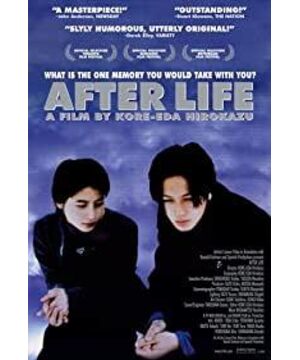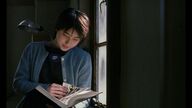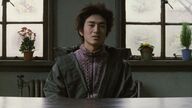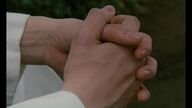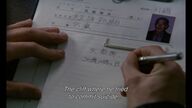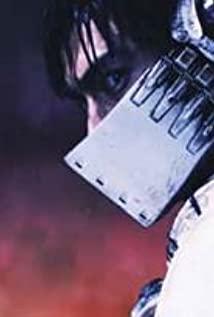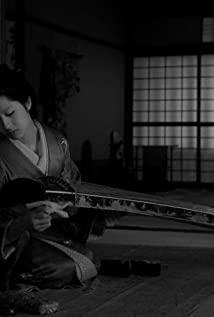I went on a trip this half month and enjoyed the beautiful scenery and cool climate. Now that I come back into the heat wave in Beijing, my heart can't help but feel hot, and my head starts to heat up, and the words I write are not so rational and sophisticated. Friends who can bear it can make do with it.
This is the second film directed by Hirokazu Koreeda.
What it is about is that before everyone goes to heaven, they have to stay at Tianguo station for a week. Under the guidance of Tianguo station staff, they look back on their life and look for the most unforgettable memories, and then make a movie clip, when people watch the film on the last day Forget everything in this world, just go to the next stop with that beautiful mood, the kingdom of heaven. What the film describes is the various stories that happened in this heavenly station.
First, he was amazed, so Hiro-eda and his rich imagination created such a "Heavenly Station" out of thin air, as well as an illusory story deduced on this basis. If you think about it, it may have something to do with the primitive beliefs rooted in the Japanese nation. We Chinese people usually think that "death is empty and everything is empty", and people die like a lamp goes out. Although there are many people who think that they will be reincarnated after death, going to heaven and going to hell, but they are just thinking about these unproven things, and they don't have a strong concern. Japan is different. With their careful thought of exhausting all the details, they do not think that death is the end of life, but feel that death is just a stop on the journey of life. The bus of life will carry these dead people to a distant place, and the next stop will be heaven or another universe. Forget everything before, and start all over again. We think this kind of nirvana is incredible, but they think it is a matter of course. Therefore, there is the behavior of committing suicide at any time, and there is a tradition of world-weariness and anticipation of the next life that is very common in the Japanese nation. Then we have to follow their train of thought to appreciate the film and understand this impossibility.
The director seems to be trying to avoid making the film a sci-fi movie. The Tianguo Station shown to the audience seems to be a very ordinary travel station, living in a simple apartment, with changes in the four seasons, and the staff in the station are also a habitual action when they go to work. Passengers come to sign in. The staff asked the guest in a normal tone: "Did you die yesterday?" The guest replied with a calm smile. In the waiting room, these dead people also greeted each other. The station even has a corporate LOGO, which is two rings set together, which means that this is a transit station between the world and the kingdom of heaven. There are also those joys, sorrows and sorrows that exist in the world, such as Li Zhong's secret love for Mochizuki, and a handful of paper cherry blossom petals given to Kawashima by the old woman. A thankful letter from Mr. Watanabe to Mochizuki. etc.
The first half of the film is completely documentary style, which is also what Hirokazu-eda is good at. Close-ups of the head, fixed camera positions, long shots, and occasional jump cuts. These give the audience a strong sense of intimacy and authenticity. When the guests were asked to share their best memories during their lifetimes, they were slightly different from the world. Here, people completely take off the masks they have worn all their lives, and what they say is their truest feelings. The red dancing shoes when I was a child, the white clouds outside the plane, the rice porridge my lover cooked for me, the warmth of my mother's leg. They no longer remember the details at that time, and whether they held the handkerchief in their left or right hand when dancing, but they will never forget the warmth engraved in their hearts. Trying to bring this momentary memory fragment into the kingdom of heaven.
The same old man, so I pay more attention to Watanabe's narrative. The 71-year-old Watanabe's life considers himself a bland and no choice. In the eyes of his wife Kyoko, he may be just a spare tire. But when he now looks back carefully on his life experience, he said: "I was very confident in my life until I came here, living my own life, and I was very happy. But looking back, I felt that something was missing, A little education, a little work, a little marriage, a little retirement. Everything is a little short.” In life, people often inadvertently ignore the moments that once brought them joy and happiness, and often work hard In the middle of the journey, they easily give up and retreat, and often focus on material enjoyment and give up spiritual pleasure. All these, when they are old and sit against the wall, they will feel "a little bit worse" and fall into With endless regret and remorse. I regret that this body is not mine, and I have no choice but to pin my hopes on the next life.
What I want to say is that a person's life consists of childhood, youth, middle age and old age, and every moment of life is precious. We should cherish our time and take our lives seriously. to find joy in life. Even in old age, spending time in endless memories is still a luxury. If there really is a Tianguo station, we might as well go back to that time and review our past gains and losses.
The film climaxes when Mochizuki finally learns of his girlfriend's whereabouts after years of waiting. He understands that "I'm part of someone else's happiness", so he relaxes and leaves. This description feels a bit far-fetched. Did he leave because he knew the result of his girlfriend, or did he leave for the sake of the happiness of others? unknown.
There is a detail in the video. The head of the night came to the room in the room, looked at the moon overhead and said, "The moon is so beautiful tonight. The moon is so charming, isn't it? Its shape never changes, but it looks very different, depending on depending on the angle of the light." Then the park bench. Watanabe and Kyoko were sitting on the bench discussing going to the movies together; Mochizuki and Kyoko were sitting on the bench saying goodbye; Mochizuki was staring at the camera on the bench alone. At the end, the audience found out that the moon was also fake. The rush brought to the audience is the nothingness of the world, and it takes time to think about it.
My rating: 7.5.
View more about After Life reviews


